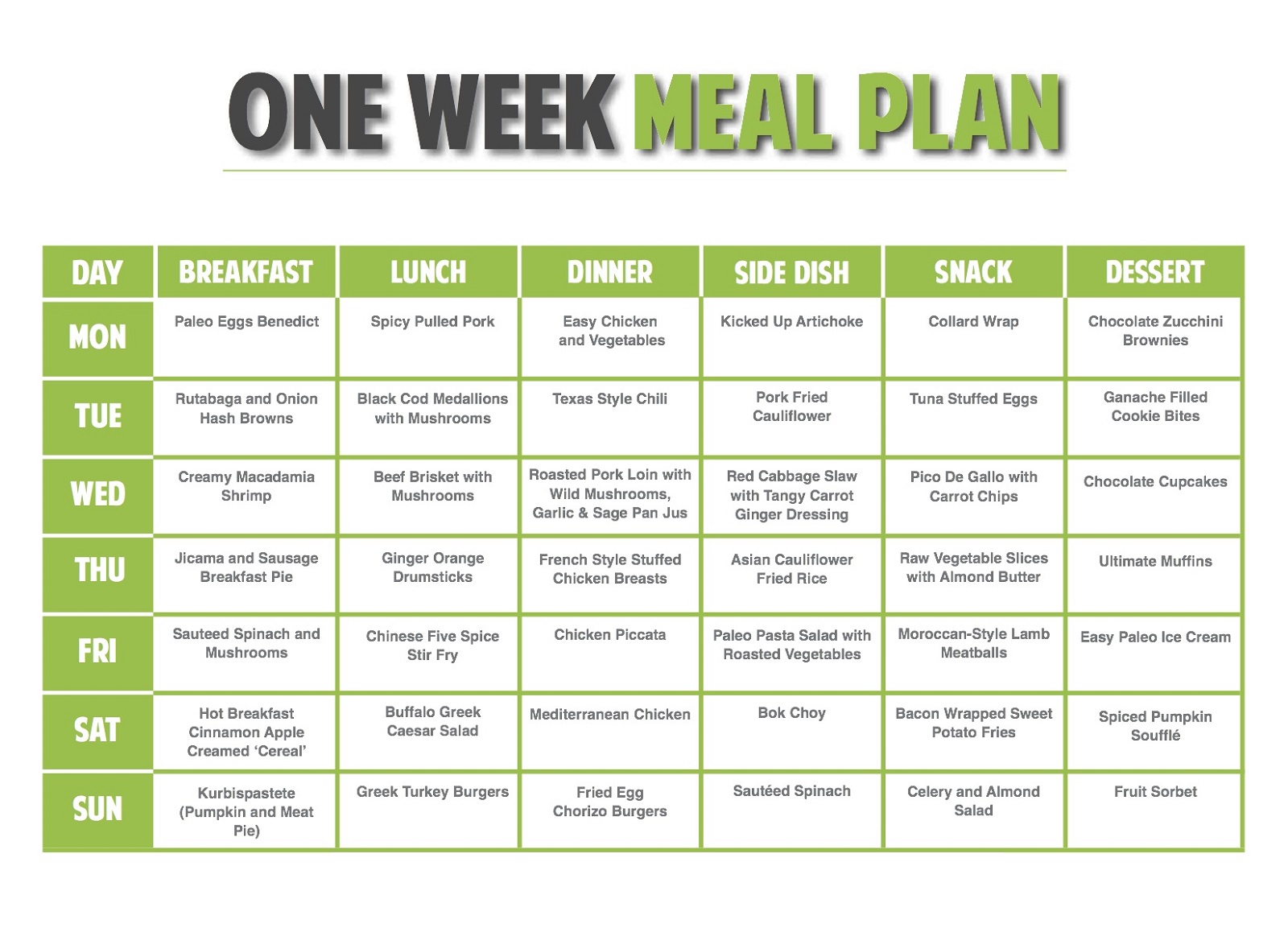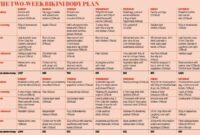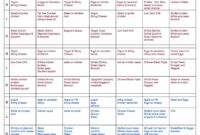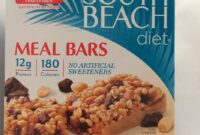Beach Diet 1 Week: Achieving a beach-ready physique in just seven days might seem appealing, but understanding the realities of rapid weight loss is crucial. This guide explores the potential benefits and significant risks associated with short-term diets, offering realistic strategies and emphasizing the importance of sustainable healthy habits. We’ll delve into sample meal plans, exercise routines, and mindset adjustments to help you navigate this journey responsibly.
While a rapid weight loss approach can be tempting, it’s vital to remember that sustainable results come from long-term lifestyle changes. This guide provides a balanced perspective, addressing both the allure and potential drawbacks of quick weight loss methods. We’ll cover everything from creating effective meal plans and workout schedules to managing cravings and building a positive mindset for long-term success. Ultimately, the goal is to equip you with the knowledge to make informed decisions that align with your health and wellness goals.
Understanding “Beach Diet 1 Week”
The term “Beach Diet 1 Week” typically refers to a very restrictive eating plan designed for rapid weight loss before a vacation or special event. These diets often promise dramatic results in a short timeframe, appealing to individuals seeking a quick fix for their weight concerns. However, it’s crucial to understand that these rapid weight loss approaches often come with significant health risks.
The common interpretations of a “beach diet” center around severely limiting caloric intake, often through extreme carbohydrate restriction, elimination of entire food groups (like fats or dairy), or reliance on restrictive meal replacements. These diets frequently involve juice cleanses, restrictive eating windows (like intermittent fasting taken to an extreme), or specific combinations of foods believed to promote rapid fat burning. The underlying premise is always the same: shed pounds quickly to achieve a desired physique before a specific date.
Potential Health Risks of Extremely Restrictive, Short-Term Diets
Extremely restrictive, short-term diets like those implied by “Beach Diet 1 Week” pose several potential health risks. These risks are amplified by the short duration, which prevents the body from adapting to the changes. Rapid weight loss can lead to muscle loss, rather than just fat loss, impacting metabolism and overall health. Nutrient deficiencies are common due to the elimination of entire food groups. This can negatively impact energy levels, immune function, and even lead to serious health problems over time. Furthermore, such diets often trigger the body’s starvation response, leading to metabolic slowdown, making it harder to maintain weight loss in the long run and increasing the likelihood of regaining any lost weight. Finally, the psychological impact can be significant, leading to disordered eating patterns and potentially even eating disorders. The stress on the body and mind associated with these diets often outweighs any short-term aesthetic benefits.
Examples of Misleading Marketing Tactics
Many “beach diets” employ misleading marketing tactics to entice consumers. These often include exaggerated claims of rapid weight loss, using before-and-after photos that may not accurately represent typical results or have been digitally altered. Testimonials are frequently presented without verification of their authenticity. Some marketing materials may exploit insecurities around body image, suggesting that a quick fix is the only way to achieve a desirable physique for a beach vacation. The diets are often presented as simple and easy to follow, downplaying the potential health risks and long-term consequences. For example, an advertisement might claim “Lose 10 pounds in 7 days with our revolutionary beach body plan!” without mentioning the potential for nutrient deficiencies or muscle loss. The emphasis is always on immediate results, overshadowing the importance of sustainable, healthy lifestyle changes.
Sample 7-Day Meal Plans
Choosing the right meal plan is crucial for achieving your beach body goals. These sample plans offer varying calorie levels to cater to different needs and preferences. Remember to consult with a healthcare professional or registered dietitian before starting any new diet plan, especially if you have underlying health conditions. These plans are examples and should be adjusted based on your individual caloric needs and activity levels.
High-Calorie Meal Plan (Approximately 2500 Calories)
This meal plan provides a higher calorie intake, suitable for individuals with high activity levels or those aiming to build muscle mass while maintaining a lean physique. Remember that portion sizes are key to managing calorie intake even in a higher calorie plan.
| Day | Breakfast | Lunch | Dinner |
|---|---|---|---|
| Monday | 4-egg omelet with spinach and feta cheese, whole-wheat toast | Grilled chicken salad with mixed greens, avocado, and a light vinaigrette | Salmon (4oz) with roasted sweet potatoes and broccoli |
| Tuesday | Oatmeal with berries, nuts, and seeds | Leftover salmon and vegetables | Lean ground beef stir-fry with brown rice |
| Wednesday | Greek yogurt with granola and fruit | Turkey breast sandwich on whole-wheat bread with lettuce and tomato | Chicken breast with quinoa and steamed asparagus |
| Thursday | Smoothie with protein powder, spinach, banana, and almond milk | Large salad with grilled shrimp and a lemon-herb dressing | Pork tenderloin with roasted Brussels sprouts and mashed sweet potatoes |
| Friday | Scrambled eggs with whole-wheat tortillas and salsa | Leftover pork tenderloin and vegetables | Baked cod with roasted vegetables |
| Saturday | Pancakes (whole wheat) with fruit and a small amount of syrup | Chicken Caesar salad (using light dressing) | Steak (4oz) with a baked potato and green beans |
| Sunday | Breakfast burrito with eggs, black beans, and salsa | Tuna salad sandwich on whole-wheat bread | Chicken and vegetable skewers with brown rice |
Recipe: Salmon with Roasted Sweet Potatoes and Broccoli: Salmon is rich in omega-3 fatty acids, beneficial for heart health and reducing inflammation. Sweet potatoes provide complex carbohydrates and fiber, while broccoli offers vitamins and antioxidants. Roast the sweet potatoes and broccoli at 400°F (200°C) for 20-25 minutes, season the salmon with herbs and spices, and bake or pan-fry until cooked through.
Recipe: Lean Ground Beef Stir-fry: Lean ground beef is a good source of protein. Stir-frying with a variety of colorful vegetables ensures a wide range of vitamins and minerals. Use a light sauce to minimize added calories and sodium.
Recipe: Chicken Breast with Quinoa and Steamed Asparagus: Chicken breast is a lean protein source. Quinoa is a complete protein and provides fiber. Asparagus is a good source of vitamins and antioxidants. Season the chicken and bake or grill. Steam the asparagus until tender-crisp.
Moderate-Calorie Meal Plan (Approximately 1800 Calories)
This plan is suitable for individuals with moderate activity levels aiming for weight maintenance or gradual weight loss. Portion control remains important.
| Day | Breakfast | Lunch | Dinner |
|---|---|---|---|
| Monday | Greek yogurt with berries | Chicken salad sandwich on whole-wheat bread | Baked chicken breast with brown rice and steamed green beans |
| Tuesday | Oatmeal with banana and cinnamon | Leftover chicken and vegetables | Lentil soup with a whole-wheat roll |
| Wednesday | Scrambled eggs with whole-wheat toast | Tuna salad (made with light mayo) on whole-wheat crackers | Salmon (3oz) with roasted vegetables |
| Thursday | Smoothie with fruit and spinach | Large salad with grilled chicken or fish | Turkey meatballs with zucchini noodles |
| Friday | Whole-wheat toast with avocado | Leftover turkey meatballs and zucchini noodles | Baked cod with quinoa |
| Saturday | Whole-grain cereal with milk and fruit | Salad with chickpeas and a light vinaigrette | Lean ground turkey stir-fry with brown rice |
| Sunday | Omelet with vegetables | Leftover stir-fry | Chicken breast with sweet potato and broccoli |
Recipe: Chicken Salad Sandwich: Use grilled or baked chicken breast, mixed with light mayonnaise, celery, and onion. Serve on whole-wheat bread for added fiber.
Recipe: Lentil Soup: Lentils are a great source of plant-based protein and fiber. This soup can be made with a variety of vegetables for added nutrients.
Recipe: Turkey Meatballs with Zucchini Noodles: Ground turkey is a lean protein source. Zucchini noodles provide a low-carbohydrate alternative to pasta.
Low-Calorie Meal Plan (Approximately 1200 Calories)
This plan is for individuals with low activity levels who are aiming for significant weight loss. It’s crucial to consult a healthcare professional before starting this plan, as it’s very restrictive.
| Day | Breakfast | Lunch | Dinner |
|---|---|---|---|
| Monday | Greek yogurt with berries | Large salad with grilled chicken (small portion) | Baked fish (small portion) with steamed vegetables |
| Tuesday | Oatmeal with a small amount of fruit | Leftover fish and vegetables | Lentil soup (small portion) |
| Wednesday | Scrambled egg whites with spinach | Tuna salad (made with light mayo) on whole-wheat crackers | Chicken breast (small portion) with steamed broccoli |
| Thursday | Smoothie with fruit and spinach | Large salad with chickpeas and a light vinaigrette | Turkey meatballs (small portion) with zucchini noodles |
| Friday | Whole-wheat toast with a small amount of avocado | Leftover turkey meatballs and zucchini noodles | Baked cod (small portion) with steamed green beans |
| Saturday | Small bowl of whole-grain cereal with milk and berries | Salad with grilled chicken (very small portion) | Grilled chicken breast (small portion) with steamed asparagus |
| Sunday | Omelet with vegetables (small portion) | Leftover chicken and vegetables | Salmon (small portion) with steamed broccoli |
Recipe: Greek Yogurt with Berries: Greek yogurt is high in protein and calcium. Berries provide antioxidants and fiber.
Recipe: Large Salad with Grilled Chicken (small portion): A large salad provides fiber and nutrients from vegetables. A small portion of grilled chicken adds lean protein.
Recipe: Baked Fish (small portion) with Steamed Vegetables: Baked fish is a lean protein source. Steamed vegetables provide vitamins and minerals with minimal added calories.
Exercise Recommendations
A balanced exercise plan complements a healthy diet, accelerating weight loss and improving overall well-being. This 7-day plan combines cardio and strength training, suitable for beginners. Remember to consult your physician before starting any new workout routine.
Consistent exercise is crucial for maximizing the benefits of the Beach Diet. Cardiovascular exercise burns calories and improves heart health, while strength training builds muscle mass, boosting metabolism and enhancing body composition. A proper warm-up prepares your body for activity, preventing injuries, while a cool-down aids recovery and reduces muscle soreness.
Warm-up and Cool-down Routines
A proper warm-up and cool-down are essential components of any workout. Neglecting these stages can increase the risk of injury and hinder recovery.
A dynamic warm-up, lasting 5-10 minutes, increases blood flow and prepares your muscles for exercise. Examples include arm circles, leg swings, and torso twists. A cool-down, also 5-10 minutes, gradually reduces your heart rate and helps your body return to a resting state. Gentle stretches, holding each for 20-30 seconds, are ideal.
Seven-Day Exercise Plan
This plan alternates between cardio and strength training days to promote overall fitness and prevent overtraining. Remember to listen to your body and adjust the intensity or duration as needed.
The following workout plan provides a sample routine. Remember to adjust the intensity and duration based on your fitness level. Proper form is crucial to avoid injuries. If you’re unsure about proper form, consult a fitness professional.
- Day 1: Cardio – 30 minutes brisk walking or jogging. Focus on maintaining a moderate intensity where you can hold a conversation but are slightly breathless.
- Day 2: Strength Training – Focus on major muscle groups.
- Squats: 3 sets of 10-12 reps, 60 seconds rest between sets.
- Push-ups: 3 sets of as many reps as possible (AMRAP), 60 seconds rest between sets.
- Lunges: 3 sets of 10-12 reps per leg, 60 seconds rest between sets.
- Plank: 3 sets, hold for 30-60 seconds, 60 seconds rest between sets.
- Day 3: Cardio – 30 minutes cycling or swimming. Maintain a moderate intensity.
- Day 4: Rest or Active Recovery – Light activity like yoga or a leisurely walk.
- Day 5: Strength Training – Focus on different muscle groups than Day 2.
- Dumbbell Rows: 3 sets of 10-12 reps per arm, 60 seconds rest between sets.
- Overhead Press: 3 sets of 10-12 reps, 60 seconds rest between sets.
- Bicep Curls: 3 sets of 10-12 reps, 60 seconds rest between sets.
- Triceps Extensions: 3 sets of 10-12 reps, 60 seconds rest between sets.
- Day 6: Cardio – 30 minutes of your preferred cardio activity. Try to incorporate interval training (alternating high and low intensity).
- Day 7: Rest or Active Recovery – Rest completely or engage in light activity.
Hydration and Supplements
Maintaining adequate hydration and considering the role of specific supplements are crucial aspects of a healthy weight loss journey, especially when following a diet like the Beach Diet. Both hydration and supplementation should be approached thoughtfully and with professional guidance.
Adequate hydration plays a vital role in weight loss and overall health. Water helps to regulate body temperature, transport nutrients, and flush out waste products. Staying well-hydrated can also boost metabolism and increase feelings of fullness, potentially aiding in calorie restriction. Dehydration, on the other hand, can lead to fatigue, decreased metabolic rate, and even hinder weight loss efforts. Aiming for consistent water intake throughout the day is essential for optimal health and successful weight management.
Supplements for Weight Loss Support
Several supplements are marketed to support weight loss, but it’s crucial to understand their potential benefits and risks. Always consult a healthcare professional before incorporating any new supplement into your diet, especially if you have pre-existing health conditions or are taking other medications. Self-treating can be dangerous and may lead to adverse effects.
Green Tea Extract
Green tea extract contains compounds like catechins, which are believed to boost metabolism and increase fat oxidation. Studies suggest that green tea extract may contribute to modest weight loss when combined with a healthy diet and exercise. However, excessive consumption can lead to digestive issues such as upset stomach and diarrhea. Furthermore, some individuals may experience caffeine-related side effects like insomnia or anxiety. The effectiveness of green tea extract varies among individuals, and results may not be significant for everyone.
Caffeine
Caffeine is a stimulant that can temporarily increase energy expenditure and improve athletic performance. Some studies suggest that caffeine can modestly contribute to weight loss by increasing metabolism and fat burning. However, excessive caffeine intake can lead to jitters, anxiety, insomnia, and digestive problems. Individuals sensitive to caffeine should consume it in moderation or avoid it altogether. Moreover, the body can develop tolerance to caffeine, reducing its effectiveness over time.
Protein Supplements
Protein supplements, such as whey protein or casein protein, can be helpful in increasing protein intake, which is important for building and maintaining muscle mass during weight loss. Adequate protein intake helps to preserve lean muscle mass while losing fat. However, excessive protein intake can strain the kidneys and may lead to dehydration. It is crucial to choose high-quality protein supplements and follow recommended dosage instructions.
Potential Challenges and Solutions
Undertaking a rapid weight loss plan like a one-week beach diet can present several hurdles. Understanding these challenges and developing proactive strategies is crucial for success and preventing potential negative health consequences. This section outlines common difficulties and offers practical solutions to help you navigate the process effectively.
Common Challenges in Rapid Weight Loss
Rapid weight loss, while potentially motivating in the short-term, often comes with various challenges. These challenges can significantly impact adherence to the diet and potentially compromise overall health if not addressed properly. Ignoring these challenges increases the likelihood of abandoning the diet and regaining any lost weight.
Challenge, Impact, Solution, and Prevention Table
The following table summarizes common challenges, their impact, practical solutions, and preventative measures to increase the likelihood of successfully completing a rapid weight loss plan.
| Challenge | Impact | Solution | Prevention Strategy |
|---|---|---|---|
| Hunger and Cravings | Reduced energy levels, difficulty concentrating, increased likelihood of abandoning the diet. Can lead to binge eating episodes. | Prioritize protein and fiber-rich foods in your meals to promote satiety. Drink plenty of water to help curb hunger. Consider incorporating healthy snacks like fruits or vegetables between meals. | Plan your meals and snacks in advance to avoid impulsive choices. Keep healthy snacks readily available. |
| Social Situations and Eating Out | Difficulty adhering to the diet when surrounded by tempting foods at social gatherings or restaurants. | Choose restaurants with healthy options. Select dishes that align with your diet plan. Communicate your dietary goals to your companions. Consider bringing a healthy snack if necessary. | Plan social outings carefully, selecting venues that offer healthy alternatives. Prepare yourself mentally for potential challenges. |
| Fatigue and Low Energy | Decreased physical and mental performance, impacting daily activities and exercise adherence. | Ensure adequate sleep (7-9 hours per night). Prioritize complex carbohydrates for sustained energy. Listen to your body and rest when needed. | Gradually increase the intensity of your exercise routine. Prioritize rest and recovery. Pay attention to your body’s signals. |
| Muscle Loss | Loss of muscle mass, impacting metabolism and overall body composition. | Incorporate strength training exercises into your routine. Consume adequate protein to support muscle maintenance. | Combine cardiovascular exercise with strength training to preserve muscle mass. Ensure sufficient protein intake. |
Realistic Expectations and Sustainability
Embarking on a weight-loss journey, especially one as focused as a “Beach Diet,” requires a clear understanding of what’s achievable within a given timeframe and how to maintain those results long-term. Setting realistic goals is paramount to success and prevents discouragement that can derail even the most determined efforts. Unrealistic expectations often lead to quick disappointments and a potential abandonment of healthy habits.
Understanding the distinction between short-term and long-term weight management strategies is crucial. Short-term strategies, like a one-week diet plan, can be effective for rapid, temporary weight loss, often involving significant dietary restrictions. However, these approaches are rarely sustainable in the long run. Long-term strategies, conversely, prioritize gradual, healthy lifestyle changes that promote sustainable weight management over the long haul. These changes focus on consistent healthy eating habits and regular physical activity, rather than extreme measures.
Short-Term versus Long-Term Weight Management Strategies
Short-term weight loss strategies often prioritize rapid weight reduction, typically through restrictive diets and intense exercise. For instance, a very low-calorie diet might lead to a significant weight loss in a week, but this loss is often primarily water weight and is unsustainable. Once normal eating patterns resume, the lost weight is quickly regained. Long-term weight management strategies, conversely, prioritize sustainable lifestyle changes. These changes involve gradual dietary modifications, incorporating more fruits, vegetables, and lean protein while reducing processed foods and sugary drinks. Regular moderate-intensity exercise, such as brisk walking or cycling, is also integrated into the daily routine. A person following a long-term strategy might lose weight more slowly, but this weight loss is more likely to be maintained over time because it’s based on lasting habits. For example, someone might gradually reduce their portion sizes over several weeks, eventually reaching a healthy weight and maintaining it through consistent healthy eating and exercise.
Effectiveness of Different Weight Loss Approaches
Different weight loss approaches vary considerably in their effectiveness and sustainability. Crash diets, characterized by severe calorie restriction, often lead to rapid initial weight loss but are typically unsustainable due to their restrictive nature and potential for nutrient deficiencies. They can also lead to muscle loss and a slower metabolism, making it harder to lose weight in the future. Conversely, balanced dietary approaches that emphasize whole foods, portion control, and regular exercise tend to yield more sustainable results. These approaches not only promote weight loss but also improve overall health and well-being. For instance, the Mediterranean diet, which is rich in fruits, vegetables, whole grains, and healthy fats, has been shown to be effective for long-term weight management and improved cardiovascular health. Similarly, incorporating regular physical activity, even in moderate amounts, can significantly enhance weight loss efforts and improve overall fitness. Studies consistently show that combining a balanced diet with regular exercise leads to more significant and lasting weight loss compared to diet alone.
Final Summary
Successfully navigating a Beach Diet 1 Week requires a holistic approach encompassing mindful eating, targeted exercise, and a positive mindset. Remember, rapid weight loss is not always sustainable, and focusing on building healthy habits that can be maintained long-term is key to achieving lasting results. This guide provides a framework for responsible weight management, but remember to consult with healthcare professionals for personalized advice tailored to your individual needs and circumstances.




